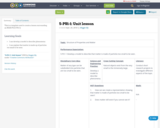
This is a template used to create a lesson surrounding an NGSS PE (5-PS1-1)
- Subject:
- Physical Science
- Material Type:
- Lesson
- Date Added:
- 06/20/2018

This is a template used to create a lesson surrounding an NGSS PE (5-PS1-1)
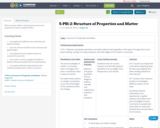
This is a lesson within a unit around structure and properties of matter using PE 5-PS1-2.
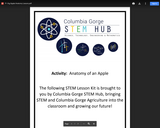
In this place-based lesson, students will dissect an apple fruit to learn more about its different parts. Includes activity instructions, extension activities, songs and rhymes, anatomy of an apple student worksheet, and sink or float student worksheet.
NGSS: K-ESS3-1, 1-LS1-1
Time: 30 minutes
Materials: "Apples Grow on Trees" or other book about apples, knife, cutting board, at least three apples, apple parts tray, and apple dissection worksheet.
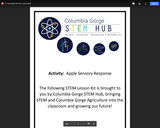
In this lesson, students will explore apples using their five senses. Includes activity instructions, extension activities, songs, and apple and five senses realted reading list.
NGSS: K-ESS3-1, 1-LS1-1
Time: 30 minutes
Materials: "Apples Grow on Trees" or other book about apples.
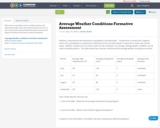
This resource provides a short reading section with experimental data and a few questions about the text. It was created with standardized assessment in mind and aligned with Next Generation Science Standards.
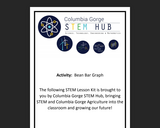
In this activity, kids will work on two fundamental early math skills – sorting/classifying, and graphing. There will also be some great fine motor skill practice! Includes place-based discussion questions, activity instructions, extension activities, songs, and student graph worksheets.
NGSS: K-LS1-1, 1-LS1-1, partially meets K-ESS3-1 (book and discussion)
Common Core: MP.4
Time: 45 minutes
Matierals: bag of dried beans ("16 bean soup"), paper bowls, glue, chart paper, the book "One Bean" or similar book about growing food plants, especially beans.
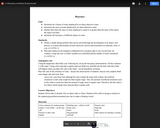
This unit consists of five lessons covering buoyancy and engineering boats. Each lesson includes goals, anticipatory set, learner objectives, guided practice, procedure instructions, closing activities, and extensions. Student handouts and worksheets are also included.
Lesson 1: Intro to Buoyancy
Lesson 2: Engineer a Barge
Lesson 3: Intro to Sails & Motion
Lesson 4: Engineer a Sailboat
Lesson 5: Final Vessel
NGSS: 3-5-ETS1-1, 3-5-ETS1-2, 3-5-ETS1-3
Lesson 1 materials: empty 2-liter bottles with tops cut off, pennies or other coins, marble, modeling clay, crap wood, rocks, pingpong ball, golf ball, popsicle stick, paper clip, scale, other object for floating or sinking
Lesson 2 materials: for each student - 12" x 12" piece of aluminum foil, 4 popsicle sticks, 2 straws, 12" masking tape; teacher pre-setup - enough pennies for testing (500 pennies per group), pool filled 2/3 with water
Lesson 3 materials: string/yarn, 1/2 straw for each student, 2 different types of paper (tissue & white copy paper), tape, scissors, fan, wooden skewers, 2 popsicle sticks per student, rulers, protractors, stencils.
Lesson 4 materials: 8 popsicle sticks, 1 wooden skewer, 1 straw, masking tape or duct tape, tissue paper or copy paper
Lesson 5 materials: same as Lesson 2
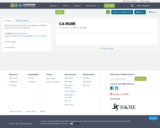
This is a site where educators can dialog on CA NGSS, share resources, and collaborate.
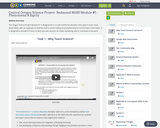
The Oregon Science Project Module #1 is designed for K-12 and nonformal educators who want to learn more about NGSS, with an emphasis on how the shift to sense-making around phenomena is at the heart of the NGSS. It is designed to provide 3-4 hours of work and asks learners to create something new to contribute to the work.
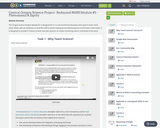
The Oregon Science Project Module #1 is designed for K-12 and nonformal educators who want to learn more about NGSS, with an emphasis on how the shift to sense-making around phenomena is at the heart of the NGSS. It is designed to provide 3-4 hours of work and asks learners to create something new to contribute to the work.
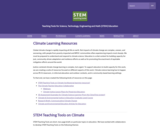
Global climate change is rapidly impacting all life on earth. But impacts of climate change are complex, uneven, and worsening, with people from poverty-impacted and BIPOC communities often experiencing impacts most sharply. We must be prepared to understand and respond to climate science. Education is a vital context for building capacity for just, community-driven adaptation and resilience efforts as well as for promoting the enactment of equitable mitigation efforts around the world.
Justice-centered climate change learning is complex, but urgent. To support educators to build capacity for this work, we are creating a suite of resources focused on different aspects of this work. Climate science learning has to happen across PK-12 classroom, in informal education and outdoor contexts, and in community-based learning settings.

This learning resource will engage you and your colleagues in learning more about the importance of learning and teaching climate science as part of the Next Generation Science Standards (NGSS). You will hear from multiple stakeholders about the importance and impact of learning about climate science, as well as engage with learning tools and reflection questions to deepen your learning and position you to take action in your setting. We envision this professional learning taking place in an ongoing community of practice. We encourage you to determine and proceed at your own pace that reflects the needs of your team.
Image by ejaugsburg from Pixabay
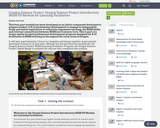
This four-part module has been developed as an initial component developed to prepare leaders of K-12 professional development to engage in independent study and initial exploration of culturally responsive teaching, the NGSS shifts, and relevant connections between NGSS and Common Core. This is part of a larger equity-focused professional development program designed for K-12 facilitators of NGSS working in throughout the rural areas of Oregon.It will take approximately 2 hours to complete and brings together many already developed resources in new ways. Module A is the introductory module for the Oregon Science Project NGSS Learning Facilitator Program. An Oregon Science Project Digital Badge is available for anyone who completes this module.If you have any feedback please email ctrecha at oregonscienceproject.org
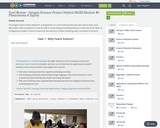
The Oregon Science Project Module #1 is designed for K-12 and nonformal educators who want to learn more about NGSS, with an emphasis on how the shift to sense-making around phenomena is at the heart of the NGSS. It is designed to provide 3-4 hours of work and asks learners to create something new to contribute to the work.
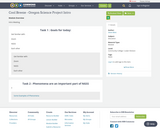
Intro Meeting
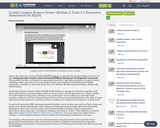
Oregon Science Project Module #3 Facilitator Video OverviewThis is the third in a series of Hybrid NGSS Modules curated by the Oregon Science Project in 2017 using already created, research-based NGSS professional development resources. This module focuses on formative assessment and how it can help educators to make student thinking visible and also how to use student ideas and models for teaching in the NGSS classroom. It builds on the work of the first two: Module #1 Phenomena & Equity, Module #2 Talk & Equity.All Oregon Science Project Hybrid NGSS PD Modules are designed to be done together with other educators in real time either online or face-to-face. The Oregon Science Project utilizes the videoconferencing tools of Zoom to run small teams of K-12 educators through these modules online in real time. Some Oregon Science Project Learning Facilitators are able to meet with their teams in person and still use these modules on computers during face-to-face work.It was built using the OER Commons Module builder so it is broken into units as Tasks. Some are meant to be done individually, while others are designed for group dialogue and interaction. Dialogue in this case is used as way to build shared understanding. This is compared to discussion where a group is working on making a decision or choice. This difference is based upon the Adaptive School Work of Garmston and Wellman. You can read more about this in Chapter 4 of the Adaptive School: A Sourcebook for Developing Collaborative Groups. The design of the modules and overall framework is also informed by the research about professional development from A Facilitator's Guide to Online Professional Development: Establishing Communities of Learning and Cultures of Thinking by Carol Brooks Simoneau and Gerald Bailey.Instructor DescriptionsAccompanying each task is a backend "Instructor Description." Each Instructor Description is only intended for the instructor or facilitator of the module and not the educator participating as a learner in the module. Each Instructor Description includesbakckground informationinstructions for facilitator preparationtips/ideas for facilitators working with a group onlinetips/ideas for face-to-face facilitationlinks to other resources when appropriateRemixing and Using this Module for Professional DevelopmentIf you would like to use this module, simply select REMIX and then edit your own copy so that it represents your facilitation style, local context, and professional development needs. This module was developed based upon the assumption that all participants have completed Oregon Science Project Hybrid NGSS Modules #1 and 2 and are studying the NGSS.Module #3 Components:Task #1 - Module #3 OverviewTask #2 - What is formative assessment? Individual WorkTask #3 - What is formative assessment? Group Reflection and DialogueTask #4- What are some high leverage practices for formative assessment in the NGSS classroom? Individual WorkTask #5 - What are some high leverage practices for formative assessment in the NGSS classroom? Group Reflection and DialogueTask #6 - How can we develop and use culturally responsive formative assessments for NGSS? Individual WorkTask #7 - How can we develop and use culturally responsive formative assessments for NGSS? Group Reflection and DialogueTask #8 - How can we integrate the NGSS practices into assessment tasks? Individual WorkTask #9 - How can we integrate the NGSS practices into assessment tasks? Group Reflection and Dialogue
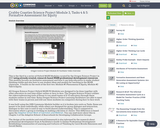
Oregon Science Project Module #3 Facilitator Video OverviewThis is the third in a series of Hybrid NGSS Modules curated by the Oregon Science Project in 2017 using already created, research-based NGSS professional development resources. This module focuses on formative assessment and how it can help educators to make student thinking visible and also how to use student ideas and models for teaching in the NGSS classroom. It builds on the work of the first two: Module #1 Phenomena & Equity, Module #2 Talk & Equity.All Oregon Science Project Hybrid NGSS PD Modules are designed to be done together with other educators in real time either online or face-to-face. The Oregon Science Project utilizes the videoconferencing tools of Zoom to run small teams of K-12 educators through these modules online in real time. Some Oregon Science Project Learning Facilitators are able to meet with their teams in person and still use these modules on computers during face-to-face work.It was built using the OER Commons Module builder so it is broken into units as Tasks. Some are meant to be done individually, while others are designed for group dialogue and interaction. Dialogue in this case is used as way to build shared understanding. This is compared to discussion where a group is working on making a decision or choice. This difference is based upon the Adaptive School Work of Garmston and Wellman. You can read more about this in Chapter 4 of the Adaptive School: A Sourcebook for Developing Collaborative Groups. The design of the modules and overall framework is also informed by the research about professional development from A Facilitator's Guide to Online Professional Development: Establishing Communities of Learning and Cultures of Thinking by Carol Brooks Simoneau and Gerald Bailey.Instructor DescriptionsAccompanying each task is a backend "Instructor Description." Each Instructor Description is only intended for the instructor or facilitator of the module and not the educator participating as a learner in the module. Each Instructor Description includesbakckground informationinstructions for facilitator preparationtips/ideas for facilitators working with a group onlinetips/ideas for face-to-face facilitationlinks to other resources when appropriateRemixing and Using this Module for Professional DevelopmentIf you would like to use this module, simply select REMIX and then edit your own copy so that it represents your facilitation style, local context, and professional development needs. This module was developed based upon the assumption that all participants have completed Oregon Science Project Hybrid NGSS Modules #1 and 2 and are studying the NGSS.Module #3 Components:Task #1 - Module #3 OverviewTask #2 - What is formative assessment? Individual WorkTask #3 - What is formative assessment? Group Reflection and DialogueTask #4- What are some high leverage practices for formative assessment in the NGSS classroom? Individual WorkTask #5 - What are some high leverage practices for formative assessment in the NGSS classroom? Group Reflection and DialogueTask #6 - How can we develop and use culturally responsive formative assessments for NGSS? Individual WorkTask #7 - How can we develop and use culturally responsive formative assessments for NGSS? Group Reflection and DialogueTask #8 - How can we integrate the NGSS practices into assessment tasks? Individual WorkTask #9 - How can we integrate the NGSS practices into assessment tasks? Group Reflection and Dialogue
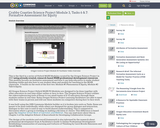
Oregon Science Project Module #3 Facilitator Video OverviewThis is the third in a series of Hybrid NGSS Modules curated by the Oregon Science Project in 2017 using already created, research-based NGSS professional development resources. This module focuses on formative assessment and how it can help educators to make student thinking visible and also how to use student ideas and models for teaching in the NGSS classroom. It builds on the work of the first two: Module #1 Phenomena & Equity, Module #2 Talk & Equity.All Oregon Science Project Hybrid NGSS PD Modules are designed to be done together with other educators in real time either online or face-to-face. The Oregon Science Project utilizes the videoconferencing tools of Zoom to run small teams of K-12 educators through these modules online in real time. Some Oregon Science Project Learning Facilitators are able to meet with their teams in person and still use these modules on computers during face-to-face work.It was built using the OER Commons Module builder so it is broken into units as Tasks. Some are meant to be done individually, while others are designed for group dialogue and interaction. Dialogue in this case is used as way to build shared understanding. This is compared to discussion where a group is working on making a decision or choice. This difference is based upon the Adaptive School Work of Garmston and Wellman. You can read more about this in Chapter 4 of the Adaptive School: A Sourcebook for Developing Collaborative Groups. The design of the modules and overall framework is also informed by the research about professional development from A Facilitator's Guide to Online Professional Development: Establishing Communities of Learning and Cultures of Thinking by Carol Brooks Simoneau and Gerald Bailey.Instructor DescriptionsAccompanying each task is a backend "Instructor Description." Each Instructor Description is only intended for the instructor or facilitator of the module and not the educator participating as a learner in the module. Each Instructor Description includesbakckground informationinstructions for facilitator preparationtips/ideas for facilitators working with a group onlinetips/ideas for face-to-face facilitationlinks to other resources when appropriateRemixing and Using this Module for Professional DevelopmentIf you would like to use this module, simply select REMIX and then edit your own copy so that it represents your facilitation style, local context, and professional development needs. This module was developed based upon the assumption that all participants have completed Oregon Science Project Hybrid NGSS Modules #1 and 2 and are studying the NGSS.Module #3 Components:Task #1 - Module #3 OverviewTask #2 - What is formative assessment? Individual WorkTask #3 - What is formative assessment? Group Reflection and DialogueTask #4- What are some high leverage practices for formative assessment in the NGSS classroom? Individual WorkTask #5 - What are some high leverage practices for formative assessment in the NGSS classroom? Group Reflection and DialogueTask #6 - How can we develop and use culturally responsive formative assessments for NGSS? Individual WorkTask #7 - How can we develop and use culturally responsive formative assessments for NGSS? Group Reflection and DialogueTask #8 - How can we integrate the NGSS practices into assessment tasks? Individual WorkTask #9 - How can we integrate the NGSS practices into assessment tasks? Group Reflection and Dialogue
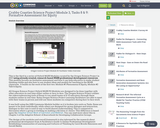
Oregon Science Project Module #3 Facilitator Video OverviewThis is the third in a series of Hybrid NGSS Modules curated by the Oregon Science Project in 2017 using already created, research-based NGSS professional development resources. This module focuses on formative assessment and how it can help educators to make student thinking visible and also how to use student ideas and models for teaching in the NGSS classroom. It builds on the work of the first two: Module #1 Phenomena & Equity, Module #2 Talk & Equity.All Oregon Science Project Hybrid NGSS PD Modules are designed to be done together with other educators in real time either online or face-to-face. The Oregon Science Project utilizes the videoconferencing tools of Zoom to run small teams of K-12 educators through these modules online in real time. Some Oregon Science Project Learning Facilitators are able to meet with their teams in person and still use these modules on computers during face-to-face work.It was built using the OER Commons Module builder so it is broken into units as Tasks. Some are meant to be done individually, while others are designed for group dialogue and interaction. Dialogue in this case is used as way to build shared understanding. This is compared to discussion where a group is working on making a decision or choice. This difference is based upon the Adaptive School Work of Garmston and Wellman. You can read more about this in Chapter 4 of the Adaptive School: A Sourcebook for Developing Collaborative Groups. The design of the modules and overall framework is also informed by the research about professional development from A Facilitator's Guide to Online Professional Development: Establishing Communities of Learning and Cultures of Thinking by Carol Brooks Simoneau and Gerald Bailey.Instructor DescriptionsAccompanying each task is a backend "Instructor Description." Each Instructor Description is only intended for the instructor or facilitator of the module and not the educator participating as a learner in the module. Each Instructor Description includesbakckground informationinstructions for facilitator preparationtips/ideas for facilitators working with a group onlinetips/ideas for face-to-face facilitationlinks to other resources when appropriateRemixing and Using this Module for Professional DevelopmentIf you would like to use this module, simply select REMIX and then edit your own copy so that it represents your facilitation style, local context, and professional development needs. This module was developed based upon the assumption that all participants have completed Oregon Science Project Hybrid NGSS Modules #1 and 2 and are studying the NGSS.Module #3 Components:Task #1 - Module #3 OverviewTask #2 - What is formative assessment? Individual WorkTask #3 - What is formative assessment? Group Reflection and DialogueTask #4- What are some high leverage practices for formative assessment in the NGSS classroom? Individual WorkTask #5 - What are some high leverage practices for formative assessment in the NGSS classroom? Group Reflection and DialogueTask #6 - How can we develop and use culturally responsive formative assessments for NGSS? Individual WorkTask #7 - How can we develop and use culturally responsive formative assessments for NGSS? Group Reflection and DialogueTask #8 - How can we integrate the NGSS practices into assessment tasks? Individual WorkTask #9 - How can we integrate the NGSS practices into assessment tasks? Group Reflection and Dialogue
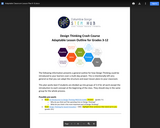
This is a highly adaptable outline for how design thinking could be introduced to your learners over a multi-day project. This plan works best if students are divided up into groups of 3-4 for all work except the introduction to each concept at the beginning of class. Learners should stay in the same group for the whole class.
Includes pre-work links, general instructions to guide planning for each day, design thinking student handouts, and multi-grade NGSS standards linked to design thinking.